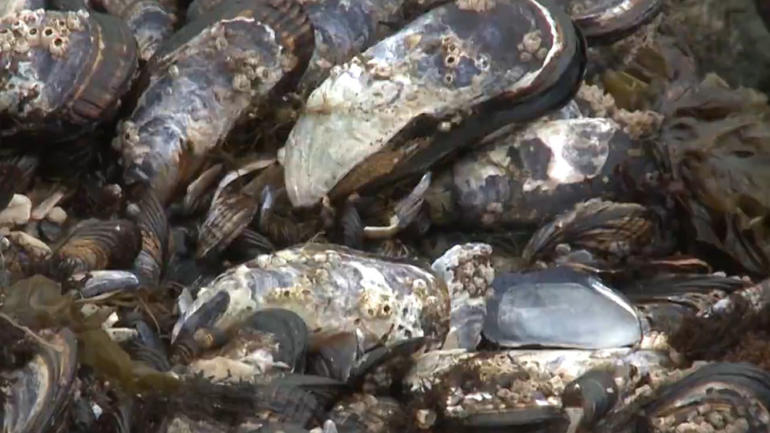Recent heatwaves across America and Europe have resulted in sweltering conditions and even several deaths. But it’s also taking a toll on other ecosystems such as sea life. CGTN’s Mark Niu reports.
During the June heat wave, Jackie Sones, research coordinator at the University of California-Davis Bodega Marine Reserve, set out to conduct research at Bodega Bay on the northern California coast.
But to her surprise, she found massive amounts of mussels cooked in their shells.
“Noticed hundreds of dead mussels right away and then I kept continuing along the shoreline and realized there was a very significant event. There were tens of thousands of muscles that had died,“ Sones said. “It’s very rare to see mortality or die-off from muscles from hot air temperatures. But this mortality event is more significant than anything we’ve seen before.”
A month later, as she walks on the coast there’s a clear and constant crunching sound. That’s an indication there are lots of dead mussels.
Sones said roughly 30 percent of the mussels died in two parts of the Bodega Bay Marine Reserve. They’ve also found anecdotal evidence of similar die-offs in other parts along the coast including an hour south in San Francisco.
The heat, a midday low tide and an uncharacteristic lack of cloud coverage formed a recipe for disaster.
Sones hands me a thermocouple temperature-measuring device to use on this typical summer day. It’s a cool 15 degrees Celsius.
But when I touch the wire against a mussel’s shell, it immediately rises to more than 27 degrees Celsius. The temperature difference between the air and the shell is great.
“Was this due to climate change’s effect on the jet stream? Cannot really tell. But the likelihood of this occurring seems to be increasing,” said John Largier, Professor of Oceanography at the University of California-Davis. “So if that is the case then climate change will make this sort of event happen more often than it used to. Maybe it used to happen once every 100 years, now it may happen every ten years.”
Largier said the die-off at Bodega Bay is probably representative of a much broader phenomenon that could result in long-term effects.
“The mussel bed itself is like a habitat and it can take a long time to establish,” said Largier. “Secondly, if all the adult mussels die there’s going to be very few babies, very few reproduction of future generations and that will take time to recover.”
Sones points out that mussels are a foundation species.
“They are providing habitat for hundreds of other animals. So a loss of the mussel bed community indicates a loss to the hundreds of other animals throughout the mussel bed,” said Sones. “A loss of mussels could impact snails, crabs, worms, sea anemones, sea cucumbers. There are over 300 species that live within the mussel bed community.”
Researchers said the die-off is far greater than anything they’ve recorded in at least 15 years. They said more research is still needed to understand what’s putting mussels under such extreme conditions.
 CGTN America
CGTN America

